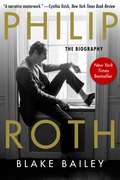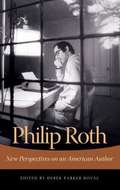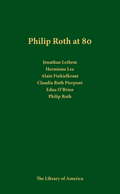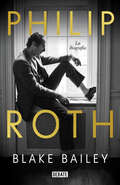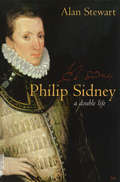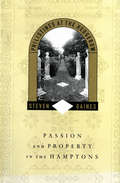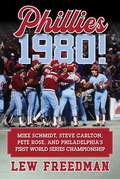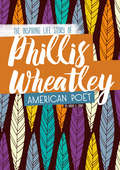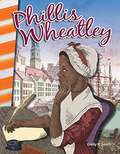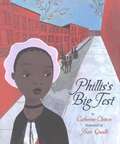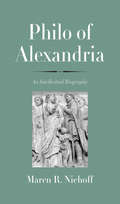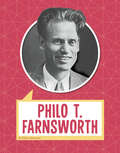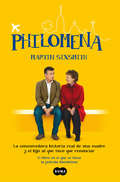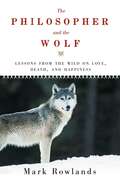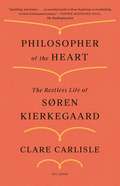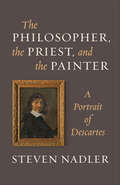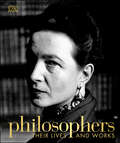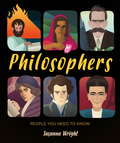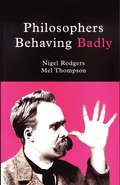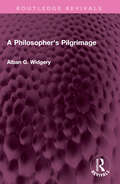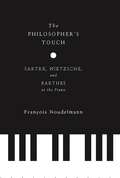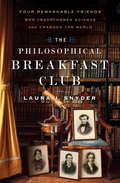- Table View
- List View
Philip Roth: The Biography
by Blake Bailey&“I don&’t want you to rehabilitate me,&” Philip Roth said to his only authorized biographer, Blake Bailey. &“Just make me interesting.&” Granted complete independence and access, Bailey spent almost ten years poring over Roth&’s personal archive, interviewing his friends, lovers, and colleagues, and listening to Roth&’s own breathtakingly candid confessions. Cynthia Ozick, in her front-page rave for the New York Times Book Review, described Bailey&’s monumental biography as &“a narrative masterwork … As in a novel, what is seen at first to be casual chance is revealed at last to be a steady and powerfully demanding drive. … under Bailey&’s strong light what remains on the page is one writer&’s life as it was lived, and―almost―as it was felt." Though Roth is generally considered an autobiographical novelist—his alter-egos include not only the Roth-like writer Nathan Zuckerman, but also a recurring character named Philip Roth—relatively little is known about the actual life on which so vast an oeuvre was supposedly based. Bailey reveals a man who, by design, led a highly compartmentalized life: a tireless champion of dissident writers behind the Iron Curtain on the one hand, Roth was also the Mickey Sabbath-like roué who pursued scandalous love affairs and aspired &“[t]o affront and affront and affront till there was no one on earth unaffronted"—the man who was pilloried by his second wife, the actress Claire Bloom, in her 1996 memoir, Leaving a Doll&’s House. Towering above it all was Roth&’s achievement: thirty-one books that give us &“the truest picture we have of the way we live now,&” as the poet Mark Strand put it in his remarks for Roth&’s Gold Medal at the 2001 American Academy of Arts and Letters ceremonial. Tracing Roth&’s path from realism to farce to metafiction to the tragic masterpieces of the American Trilogy, Bailey explores Roth&’s engagement with nearly every aspect of postwar American culture.
Philip Roth: New Perspectives on an American Author
by Derek Parker RoyalFrom the introduction: "Each of the seventeen chapters that follow is an attempt to glimpse beneath one of Philip Roth's masks, while at the same time acknowledging the possibility of other masks layered in other reaches. The contributors vary widely in their critical perspectives, but such diversity parallels the multifaceted nature of Roth's writings. Nevertheless, all of the analyses share a common ground in their efforts to present a unique reading of one or more of Roth's works. Each chapter introduces a particular book (sometimes more than one), provides a brief summary of the text's storyline, moves on to an examination of its various literary elements (i.e., discusses basic critical issues pertaining to the plot, characters, settings, themes, symbols, points of view, and style), and then contextualizes the significance of the book within the overall body of Roth's oeuvre."
Philip Roth at 80: A Celebration
by Philip RothOn March 19, 2013, a distinguished group of writers and critics gathered at the Newark Museum's Billy Johnson Auditorium in Newark, New Jersey, to celebrate the extraordinary career and lasting literary legacy of Philip Roth on the occasion of his 80th birthday. This keepsake volume gathers remarks from the evening's speakers, a fitting tribute to the only living novelist whose work is collected in the Library of America series. Here you'll find Jonathan Lethem, hilariously recounting his first consciousness-raising encounter with Roth's work through the Kafkaesque novel The Breast; Hermione Lee, tracing the Shakespearian themes in Roth's books, from Portnoy's Complaint to The Humbling; Alain Finkielkraut, offering a deep reading of Roth's final novel, Nemesis; Claudia Roth Pierpont, assessing Roth's portrayal of women in such books as Sabbath's Theater and The Human Stain; Edna O'Brien, recalling her long friendship with Roth; and the author himself, offering a quintessentially Rothian valediction.
Philip Roth. La biografía
by Blake BaileyUn retrato profundamente realista del maestro literario estadounidense y de la escena cultural de la posguerra. La figura del escritor ha encontrado pocas encarnaciones tan emblemáticas como en Philip Roth. Tras pasar años estudiando a fondo su archivo personal, Blake Bailey realizó entrevistas a amigos, amantes y colegas, y mantuvo conversaciones de una franqueza asombrosa con el propio Roth. Esta biografía recorre la vida del autor, desde su infancia, en un entorno judío de clase media-baja, hasta la cumbre de su fama. Analiza el peso que su desastroso primer matrimonio tuvo en su carrera, su labor en beneficio de colegas disidentes del otro lado del Telón de Acero, su rivalidad con amigos como John Updike o William Styron y su tumultuosa vida amorosa, en especial su relación con Claire Bloom. Un texto honesto y documentado a conciencia que rastrea el recorrido de un maestro de la novela tan amado como cuestionado, pero imprescindible para la literatura contemporánea. La crítica ha dicho:«Una biografía encantadora, sabia e ingeniosa que logra un equilibrio y una exhaustividad que parecerían imposibles tras tan poco tiempo de la muerte de Roth».Jonathan Lethem «Todo lo que siempre quiso saber sobre Philip Roth lo puede descubrir en sus novelas. Todo lo que siempre quiso saber sobre lo que le costó convertirse en uno de los mayores escritores estadounidenses de nuestro tiempo lo encontrará en la impresionante biografía de Blake Bailey».Nicole Krauss «La novela del siglo XIX sigue viva. Su nombre hoy es «biografía»; su naturaleza es de magnitud dostoievskiana. Y el exhaustivo relato de la vida de Philip Roth que hace Bailey es una obra maestra de la narrativa».Cynthia Ozick «Superlativa, definitiva y genuinamente apasionante. Guía con lucidez a través de un denso palimpsesto de identidades ficticias, enemistades literarias y mujeres».The Sunday Times «Una lectura compulsiva. Magníficamente escrita. Es difícil imaginar un libro que ofrezca respuestas más definitivas que este».The Observer
Philip Roth (Modern Critical Views)
by Harold BloomThis book is part of Chelsea House Publishers' Modern Critical Views series. This volume gathers together what, in its editor's judgment, is a representative selection of the best criticism so far devoted to the fiction of Philip Roth, arranged in the order of critical publication. The editor's "Introduction" centers upon Roth's major achievement, the trilogy Zuckerman Bound, with its epilogue The Prague Orgy. By insisting upon the profound moral intensity of Roth's vision, the editor sets himself at some variance with much received opinion upon Roth's work.
Philip Sidney: A Double Life
by Alan StewartCourtier, poet, soldier, diplomat - Philip Sidney was one of the most promising young men of his age. Son of Elizabeth I's deputy in Ireland, nephew and heir to her favourite, Leicester, he was tipped for high office - and even to inherit the throne. But Sidney soon found himself caught up in the intricate politics of Elizabeth's court and forced to become as Machiavellian as everyone around him if he was to achieve his ambitions. Against a backdrop of Elizabethan intrigue and the battle between Protestant and Catholic for predominance in Europe, Alan Stewart tells the riveting story of Philip Sidney's struggle to suceed. Seeing that his continental allies had a greater sense of his importance that his English contamporaries, Philip turned his attention to Europe. He was made a French baron at seventeen, corresponded with leading foreign scholars, considered marriage proposals from two princesses and, at the time of his tragically early death, was being openly spoken of as the next ruler of the Netherlands.
Philistines at the Hedgerow: Passion and Property in the Hamptons
by Steven GainesBestselling author Steven Gaines's "richly entertaining" (People) and juicy social history of the Hamptons.As one of America's most fabled communities--long a magnet for artists, celebrities, the very rich, and their respective hangers-on--the Hamptons have been a scene of constant collision among the established old guard, New Money, and the local families who farmed and fished the region for generations. In serving up three centuries of Hamptons history, Steven Gaines introduces a host of colorful characters including Jackson Pollock, Ron Perelman, Lauren Bacall, and the Bouvier Beales of Grey Gardens infamy.Philistines at the Hedgerow is a mesmerizing feat of storytelling--a book that takes us behind the privet hedges and rolling sand dunes and brings vivid life to the curious passions and personalities that animate the Hamptons.
Phillies 1980!: Mike Schmidt, Steve Carlton, Pete Rose, and Philadelphia's First World Series Championship
by Lew FreedmanHow the 1980 Philadelphia Phillies Won the First World Series Championship in Franchise History The road was rocky and the suspense intense as a make-or-break 1980 baseball season unfolded for the Philadelphia Phillies under a new, often-unpopular manager who sought to shape a collection of All-Star talent into champions. In the end, Dallas Green&’s gruffness, Pete Rose&’s clubhouse leadership, Mike Schmidt&’s Most Valuable Player performance, Steve Carlton&’s almost unbeatable pitching, Tug McGraw&’s irrepressible personality—plus contributions from young, unheralded players and savvy veterans—led the club to the franchise&’s first World Series in history. Although the Phillies had risen to prominence and relevance in the late 1970s, they could not get past the National League Championship Series. Management was tempted to blow up the team. Wooing Rose as a free agent to add spirit, as well as a clutch bat, and the promotion of the reluctant Green from the farm system in place of well-liked Danny Ozark, helped change the dynamics of the team. The risky strategy led to some internal discord and relentless challenges from Green, but after months of seeming slow to emerge as a team prepared to grab a championship, the Phillies clutch ballplaying through the end of September to qualify for the playoffs, and then played inspired baseball when most needed in October. Some forty years later, that Phillies group is especially prized for the breakthrough in a near-century-long wait for a title for a club that began play in 1883. Only once since then have the Phillies claimed another crown. The mix of superstars, with the major influence of such players as Bob Boone, Larry Bowa, Greg Luzinski, Lonnie Smith, Manny Trillo, Garry Maddox, and Bake McBride helped take the Phillies on a months-long-ride, culminating in the glory they and their fans both hungered for for so long.
Phillis Sings Out Freedom
by Ann Malaspina Susan KeelerIn the fall of 1775, General George Washington was struggling to find a way to fight the British so that the colonies could be free from England. Phillis Wheatley, an African American poet who herself had struggled to gain freedom, decided to write Washington a poem of encouragement. Ann Malaspina's inspiring story shows the life and times of these two brave people who did so much to lay the foundation of our country.
Phillis Wheatley: The Inspiring Life Story of the American Poet (Inspiring Stories)
by Robin S. DoakA young, sickly Phillis Wheatley was brought to Massachusetts as a slave. She grew up in two worlds treated well and educated but still enslaved. In her short life she wrote nearly 150 poems and became the first African-American poet to publish a book. She died alone and in poverty, but her poems live on. They provide a unique perspective on life in colonial America in the late 1700s.
Phillis Wheatley: Phillis Wheatley - Grades 4-5 - Guided Reading Level O (Social Studies: Informational Text Series)
by Emily SmithIgnite your students' passion for history through the use of intriguing primary sources! The Primary Source Reader series features purposefully leveled text to increase comprehension for different learner types. Students will learn about the fascinating life and times of Phillis Wheatley and her important contributions to history. This informational text includes captions, a glossary, an index, and other text features that will increase students' reading comprehension. It aligns with state standards including NCSS/C3, McREL, and WIDA/TESOL and prepares students for college and career readiness.
Phillis's Big Test
by Catherine Clinton Sean QuallsIn 1773, Phillis Wheatley published a book of poetry. It was a great accomplishment that made her very famous.Only a year before, Phillis had had to take a test to prove that she was the actual author of these poems, because Phillis Wheatley was a slave.Who would believe that an African girl could be the author of such poetry?Phillis did! She believed in herself, and took every opportunity she could to make her life better. She believed in the power of her words, and her writing to prove her talent, and used the power of words to change a life.
Philo of Alexandria: An Intellectual Biography
by Maren R. NiehoffPhilo was a Hellenistic Jewish philosopher who left behind one of the richest bodies of work from antiquity, yet his personality and intellectual development have remained a riddle. Maren Niehoff presents the first biography of Philo, arguing that his trip to Rome in 38 CE was a turning point in his life. There he was exposed not only to new political circumstances but also to a new cultural and philosophical environment. Following the pogrom in Alexandria, Philo became active as the head of the Jewish embassy to Emperor Gaius and as an intellectual in the capital of the empire, responding to the challenges of his time and creatively reconstructing his identity, though always maintaining pride in the Jewish tradition. Philo’s trajectory from Alexandria to Rome and his enthusiastic adoption of new modes of thought made him a key figure in the complex negotiation between East and West.
Philo T. Farnsworth (Biographies)
by Ellen LabrecqueHow much do you know about Philo T. Farnsworth? Find out the facts you need to know about this inventor, scientist, and TV pioneer. You’ll learn about the early life, challenges, and major accomplishments of this important American.
Philomena
by Martin SixsmithNew York Times Bestseller. Now a major motion picture starring Judi Dench and Steve Coogan and nominated for four Academy Awards: the heartbreaking true story of an Irishwoman and the secret she kept for 50 years. When she became pregnant as a teenager in Ireland in 1952, Philomena Lee was sent to a convent to be looked after as a "fallen woman. ” Then the nuns took her baby from her and sold him, like thousands of others, to America for adoption. Fifty years later, Philomena decided to find him. Meanwhile, on the other side of the Atlantic, Philomena’s son was trying to find her. Renamed Michael Hess, he had become a leading lawyer in the first Bush administration, and he struggled to hide secrets that would jeopardize his career in the Republican Party and endanger his quest to find his mother. A gripping exposé told with novelistic intrigue, Philomena pulls back the curtain on the role of the Catholic Church in forced adoptions and on the love between a mother and son who endured a lifelong separation.
The Philosopher and the Wolf: Lessons From The Wild On Love, Death And Happiness
by Mark RowlandsThe charming and poignant story of the relationship between a philosophy professor and his pet wolf.Mark Rowlands was a young philosophy professor, rootless and searching for life&’s greater meaning. Shortly after arriving at the University of Alabama, he noticed a classified ad in the local paper advertising wolf cubs for sale and decided he had to investigate, if only out of curiosity. It was love at first sight, and the bond that grew between philosopher and wolf reaffirms for us the incredible relationships that exist between man and animal. Mark welcomed his new companion, Brenin, into his home. More than just an exotic pet, Brenin exerted an immense influence on Rowlands both as a person, and, strangely enough, as a philosopher, leading him to reevaluate his attitude toward love, happiness, nature, death, and the true meaning of companionship.
Philosopher of the Heart: The Restless Life of Søren Kierkegaard
by Clare CarlislePhilosopher of the Heart is the groundbreaking biography of renowned existentialist Søren Kierkegaard’s life and creativity, and a searching exploration of how to be a human being in the world.Søren Kierkegaard is one of the most passionate and challenging of all modern philosophers, and is often regarded as the founder of existentialism. Over about a decade in the 1840s and 1850s, writings poured from his pen pursuing the question of existence—how to be a human being in the world?—while exploring the possibilities of Christianity and confronting the failures of its institutional manifestation around him.Much of his creativity sprang from his relationship with the young woman whom he promised to marry, then left to devote himself to writing, a relationship which remained decisive for the rest of his life. He deliberately lived in the swim of human life in Copenhagen, but alone, and died exhausted in 1855 at the age of 42, bequeathing his remarkable writings to his erstwhile fiancée. Clare Carlisle’s innovative and moving biography writes Kierkegaard’s life as far as possible from his own perspective, to convey what it was like actually being this Socrates of Christendom—as he put it, living life forwards yet only understanding it backwards.
The Philosopher, the Priest, and the Painter: A Portrait of Descartes
by Steven NadlerHow a famous painting opens a window into the life, times, and philosophy of René DescartesIn the Louvre museum hangs a portrait that is considered the iconic image of René Descartes, the great seventeenth-century French philosopher. And the painter of the work? The Dutch master Frans Hals—or so it was long believed, until the work was downgraded to a copy of an original. But where is the authentic version, and who painted it? Is the man in the painting—and in its original—really Descartes?A unique combination of philosophy, biography, and art history, The Philosopher, the Priest, and the Painter investigates the remarkable individuals and circumstances behind a small portrait. Through this image—and the intersecting lives of a brilliant philosopher, a Catholic priest, and a gifted painter—Steven Nadler opens a fascinating portal into Descartes's life and times, skillfully presenting an accessible introduction to Descartes's philosophical and scientific ideas, and an illuminating tour of the volatile political and religious environment of the Dutch Golden Age. As Nadler shows, Descartes's innovative ideas about the world, about human nature and knowledge, and about philosophy itself, stirred great controversy. Philosophical and theological critics vigorously opposed his views, and civil and ecclesiastic authorities condemned his writings. Nevertheless, Descartes's thought came to dominate the philosophical world of the period, and can rightly be called the philosophy of the seventeenth century.Shedding light on a well-known image, The Philosopher, the Priest, and the Painter offers an engaging exploration of a celebrated philosopher's world and work.
Philosophers: Their Lives and Works (DK History Changers)
by DKFrom Confucius and Plato to Karl Marx and Noam Chomsky, this book brings together more than 100 illustrated biographies of the world's great philosophers.Introduced with a stunning portrait of each featured philosopher, the biographies trace the ideas, friendships, loves, and rivalries that inspired the great thinkers and influenced their work, providing revealing insights into what drove them to question the meaning of life and come up with new ways of understanding the world and the history of ideas.Lavishly illustrated with photographs and paintings of philosophers, their homes, friends, studies, and their personal belongings, together with pages from original manuscripts, first editions, and correspondence, this book introduces the key ideas, themes, and working methods of each featured individual, setting their ideas within a wider historical and cultural context. Charting the development of ideas across the centuries in both the East and West, from ancient Chinese philosophy to the work of contemporary thinkers, Philosophers provides a compelling glimpse into the personal lives, loves, and influences of the great philosophers as they probed into life's big ideas.
Philosophers (People You Need To Know #1)
by Susanna WrightThink outside of the box with 20 of the world's brilliant thinkers. Discover the lives of ten female and ten male philosophers from throughout history and from around the world. Philosophers is a perfect introduction to philosophy and some of the most dramatic and world-changing lives that challenged the thinking around reason, race, gender, politics, difference and diversity. Which philosopher felt that thinking proved he existed? Which philosopher wants us to abolish all governments? Who set the groundwork for the feminist movement? Who should we blame for anxiety? Meet Gargi Vachaknavi in India, the Greeks, such as Socrates and Aristotle, then Descartes, Kant, Wollstonecraft, Nietzsche, Arendt, de Beauvoir, Fanon and Piper - just to name a few! Beautiful and characterful portraits help bring to life these important thinkers and their contributions to our world. Clear, concise text presents key philosophical concepts alongside the stand-out biographical information from fascinating thinkers.
Philosophers Behaving Badly
by Mel Thompson Nigel RodgersAn engaging and often hilarious survey of the far-from-fusty extra-curricular activities of some of philosophy's finest practitioners Philosophers Behaving Badly examines the lives of eight great philosophers--Rousseau, whose views on education and the social order seem curiously at odds with his own outrageous life; Schopenhauer and Nietzsche, two giants of the 19th century whose words seem ever more relevant today; and five immensely influential philosophers of the 20th century, Russell, Wittgenstein, Heidegger, Sartre, and Foucault.
A Philosopher's Pilgrimage (Routledge Revivals)
by Alban G. WidgeryFirst Published in 1961 A Philosopher's Pilgrimage is a plain-spoken autobiography of Alban G. Widgery. This is the record of the life of a philosopher who never allowed concern with ideas to distract him from the richness of experiences. He was a student, colleague and friend of some of the leading personalities of the last half century. Having lived in England, Scotland, Germany, France, India, Hawaii, and the United States, he formed definite impressions of their peoples. In India, on the personal staff of H.H. Sayaji Rao III, he greatly influenced him in his pioneer achievements. Associated with Hindus, Buddhists, Parsis, Muslims, and Jews, he came to appreciate essentials of their faiths. He critically considered the teachings of such thinkers as Nietzsche, Tolstoy, and Shaw. With a clarity of exposition and with humour he presents a philosophy of life worthy of serious consideration. This book will be of interest to students of philosophy.
The Philosopher’s Touch: Sartre, Nietzsche, and Barthes at the Piano (European Perspectives: A Series in Social Thought and Cultural Criticism)
by François NoudelmannRenowned philosopher and prominent French critic François Noudelmann engages the musicality of Jean-Paul Sartre, Friedrich Nietzsche, and Roland Barthes, all of whom were amateur piano players and acute lovers of the medium. Though piano playing was a crucial art for these thinkers, their musings on the subject are largely scant, implicit, or discordant with each philosopher's oeuvre. Noudelmann both recovers and integrates these perspectives, showing that the manner in which these philosophers played, the composers they adored, and the music they chose reveals uncommon insight into their thinking styles and patterns.Noudelmann positions the physical and theoretical practice of music as a dimension underpinning and resonating with Sartre's, Nietzsche's, and Barthes's unique philosophical outlook. By reading their thought against their music, he introduces new critical formulations and reorients their trajectories, adding invaluable richness to these philosophers' lived and embodied experiences. The result heightens the multiple registers of being and the relationship between philosophy and the senses that informed so much of their work. A careful reader of music, Noudelmann maintains an elegant command of the texts under his gaze and appreciates the discursive points of musical and philosophical scholarship they involve, especially with regard to recent research and cutting-edge critique.
The Philosophical Breakfast Club: Four Remarkable Friends Who Transformed Science and Changed the World
by Laura J. SnyderThe Philosophical Breakfast Club recounts the life and work of four men who met as students at Cambridge University: Charles Babbage, John Herschel, William Whewell, and Richard Jones. Recognizing that they shared a love of science (as well as good food and drink) they began to meet on Sunday mornings to talk about the state of science in Britain and the world at large. Inspired by the great 17th century scientific reformer and political figure Francis Bacon—another former student of Cambridge—the Philosophical Breakfast Club plotted to bring about a new scientific revolution. And to a remarkable extent, they succeeded, even in ways they never intended. Historian of science and philosopher Laura J. Snyder exposes the political passions, religious impulses, friendships, rivalries, and love of knowledge—and power—that drove these extraordinary men. Whewell (who not only invented the word “scientist,” but also founded the fields of crystallography, mathematical economics, and the science of tides), Babbage (a mathematical genius who invented the modern computer), Herschel (who mapped the skies of the Southern Hemisphere and contributed to the invention of photography), and Jones (a curate who shaped the science of economics) were at the vanguard of the modernization of science. This absorbing narrative of people, science and ideas chronicles the intellectual revolution inaugurated by these men, one that continues to mold our understanding of the world around us and of our place within it. Drawing upon the voluminous correspondence between the four men over the fifty years of their work, Laura J. Snyder shows how friendship worked to spur the men on to greater accomplishments, and how it enabled them to transform science and help create the modern world.
The Philosophical Breakfast Club
by Laura J. SnyderThe Philosophical Breakfast Club recounts the life and work of four men who met as students at Cambridge University: Charles Babbage, John Herschel, William Whewell, and Richard Jones. Recognizing that they shared a love of science (as well as good food and drink) they began to meet on Sunday mornings to talk about the state of science in Britain and the world at large. Inspired by the great 17th century scientific reformer and political figure Francis Bacon--another former student of Cambridge--the Philosophical Breakfast Club plotted to bring about a new scientific revolution. And to a remarkable extent, they succeeded, even in ways they never intended. Historian of science and philosopher Laura J. Snyder exposes the political passions, religious impulses, friendships, rivalries, and love of knowledge--and power--that drove these extraordinary men. Whewell (who not only invented the word "scientist," but also founded the fields of crystallography, mathematical economics, and the science of tides), Babbage (a mathematical genius who invented the modern computer), Herschel (who mapped the skies of the Southern Hemisphere and contributed to the invention of photography), and Jones (a curate who shaped the science of economics) were at the vanguard of the modernization of science. This absorbing narrative of people, science and ideas chronicles the intellectual revolution inaugurated by these men, one that continues to mold our understanding of the world around us and of our place within it. Drawing upon the voluminous correspondence between the four men over the fifty years of their work, Laura J. Snyder shows how friendship worked to spur the men on to greater accomplishments, and how it enabled them to transform science and help create the modern world.From the Hardcover edition.
